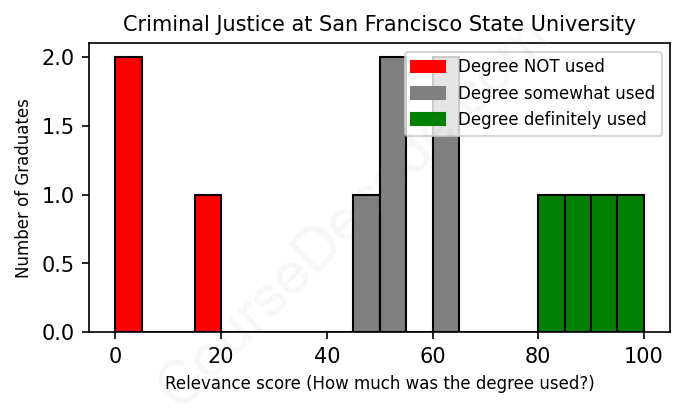
First, some facts. Of the Criminal Justice graduates from San Francisco State University we've analyzed , here's how many have used (or NOT used) their degree in their career:

These are estimates based on AI analysis of 12 LinkedIn profiles (see below).
The verdict? Significantly below average. Overall, with an average relevance score of 53%, Criminal Justice graduates from San Francisco State University have a much lower likelihood (-14%) of finding work in this field compared to the average graduate across all fields:
And for comparison, here's the chart for all profiles we've looked at across all degrees.
Also, after graduating, 50% of these graduates have pursued further education other than another Bachelor's degree (such as a Masters degree or other), compared to the average across all profiles of 35%. This suggests you may need more than just a Bachelors degree to be competitive as a Criminal Justice graduate.
See the details:
|
Relevance score: 15% We think this person has NOT gone into a career related to their degree. We think this person has NOT gone into a career related to their degree.
DEGREE INFOGraduated in 2020 from San Francisco State University with a Bachelor's degree in Criminal Justice. Also pursued further education since (see below). JOB HISTORY SINCE GRADUATIONWillie Brown Jr. Fellow The Department of Public Health Jan 2020 - May 2020 Tenants Rights and Community Organizer  Tenderloin Housing Clinic Jul 2020 - Jan 2021 Associate Teacher  De Marillac Academy Jan 2021 - Present FURTHER DEGREES DONE SINCE GRADUATINGMaster of Education - MEdUniversity of San Francisco 2022 - 2023 ABOUTExperienced Community Organizer with a demonstrated history of working in the non-profit organization management industry. Skilled in Leadership, Strategic Planning, Public Speaking, Customer Service, and Microsoft Office. Strong administrative professional with a Bachelor's degree focused in Criminal Justice from San Francisco State University. |
The top 10 most common jobs done by the graduates we've analyzed (ranked most common to least) are:
So, when you look at the types of jobs that people who studied Criminal Justice at San Francisco State University are landing, it’s a bit of a mixed bag. A good chunk of graduates have wound up in administrative roles, project management, or even education-related jobs, like working in schools as aides or teachers. These positions don’t really tap into the core knowledge of Criminal Justice, which is kind of a bummer. They might use some skills that are tangentially related—like understanding social dynamics or providing support—but they’re mostly about administration or teaching rather than law or justice systems.
On the flip side, there are also graduates who are in roles that are directly tied to Criminal Justice, like Case Managers, Probation Officers, and positions within various public service departments focusing on reentry programs. These jobs definitely utilize the skills and principles learned during their studies. It seems like while a decent number of people ended up in relevant fields, many chose paths that didn’t require much from their degrees. So, if you’re thinking about a Criminal Justice degree, it might be wise to have a clear idea of the type of career you want to pursue afterward, as some jobs might not directly relate to all the cool things you’ll study in college.
Here is a visual representation of the most common words in job titles for Criminal Justice graduates (this is across all Criminal Justice graduates we've analyzed, not just those who went to San Francisco State University):

When looking at the career trajectories of graduates from San Francisco State University with a degree in Criminal Justice, it seems like they start in a mix of entry-level positions that either relate directly to the field or drift into adjacent areas. For many, the first job out of college often involves roles in educational support, case management, or administrative assistance. For instance, some graduates worked as inclusion aides or associates in schools, while others landed as administrative interns in criminal justice organizations. This indicates that while they are initially aligned with their studies, they might not jump straight into traditional law enforcement or legal roles right after graduation.
As we look at these careers five to ten years down the line, there’s a more noticeable trend toward stability in roles that connect to criminal justice. Many have eventually moved into case management, roles in adult probation departments, or positions focused on reentry services, reflecting a dedication to supporting individuals in the justice system. However, not everyone seems to be hitting the mark in criminal justice-related fields. Some graduates have taken off in directions like teaching, administrative roles in various sectors, or even coaching, which could suggest that they have either found alternative passions or that the job market led them that way. Overall, while some graduates have successfully built solid careers in criminal justice, others appear to have veered into less related paths, creating a mixed bag of outcomes for degree holders from this program.
Getting a Bachelor’s degree in Criminal Justice at San Francisco State University is about average in terms of difficulty compared to other colleges. You’ll have a good mix of lectures, discussions, and some hands-on work, so it’s not just sitting in a classroom memorizing stuff. There are definitely challenging classes, especially if you’re diving into things like law, research methods, or criminology theories, but if you're passionate about the topic and are willing to put in the effort, you'll likely find it manageable. Just make sure you stay organized and on top of your assignments, and you'll be just fine!
Most commonly, in the LinkedIn profiles we've looked at, it takes people 4 years to finish a Bachelor degree in Criminal Justice.
Looking at these Criminal Justice graduates from San Francisco State University, it seems like their earning potential varies quite a bit. Some of them, especially those who’ve moved up in roles like the Senior Project Manager and Reentry Services Manager, likely have decent salaries, given their positions and years of experience. However, others, especially those in education or entry-level roles like customer service, probably aren’t making as much, especially considering the cost of living in places like the Bay Area. Overall, it looks like some are doing well financially, while others might be scraping by a bit more. It’s kind of a mixed bag!
Here is a visual representation of the most common words seen in the "about" section of LinkedIn profiles who have a Bachelor degree in Criminal Justice (this is across all Criminal Justice graduates we've analyzed, not just those who went to San Francisco State University). This may or may not be useful:

Here are all colleges offering a Bachelor degree in Criminal Justice (ordered by the average relevance score of their Criminal Justice graduates, best to worst) where we have analyzed at least 10 of their graduates: